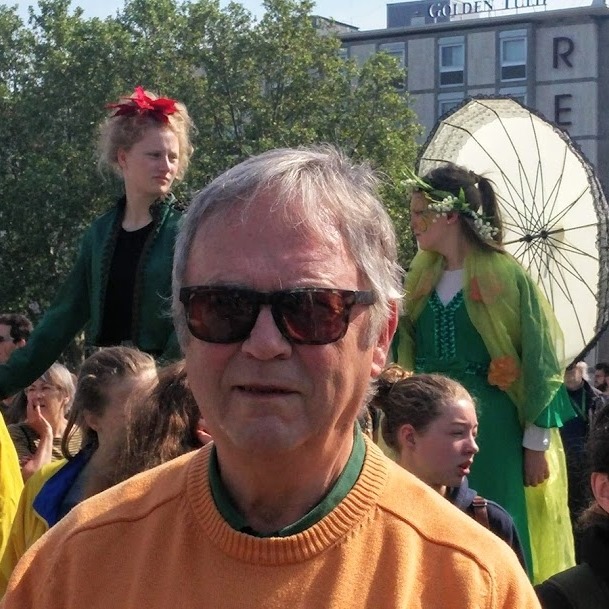(3) Robert Dallek, An Unfinished Life: John F. Kennedy: 1917-1963 (Little, Brown, 2003).
Now, because Dr. Doris Kearns Goodwin characterizes her "Personal History of the 1960s" as "An Unfinished Love Story," I am inclined also to characterize my memories here of the 1960s as an unfinished love story.
However, in doing this, I am also prompted to characterize the idealized memories of the 1950s of Trump and his most adamant white followers an unfinished love story for them. By saying this, I also mean to say that our contemporary culture war involves two competing unfinished love stories.
Because I align the idealized unfinished love story of the 1950s of Trump and his most adamant white followers with the print culture that emerged in Western culture after the Gutenberg printing press emerged in Europe in the mid-1450s, I suspect that their idealized unfinished love story of the 1950s also involves their strong resistance to the unsettling currents deep in their psyches to what Ong refers to as our contemporary secondary oral culture.
But Dr. Doris Kearns Goodwin's and also my unfinished love story of the 1960s involved our responding positively and creatively to the unsettling currents deep in their psyches to what Ong refers to as secondary orality.
MY PERSONAL CONSIDERATIONS ABOUT THE 1960s
Now, just as the above introductory section was wide-ranging, and at times meandering, so too this section about me and my memories of the 1960s is wide-ranging, and at times meandering. However, in the final analysis, the present section, like the above section, is ultimately aimed at describing cultural factors in the 1960s that may have contributed to the present trend in this election year of favoring cultural factors over economic factors (discussed below).
I was born in 1944 in Ossining, New York, my father's hometown. However, at the time of my birth, my father was in the U.S. Army and stationed in England as part of the troop buildup there for D-Day invasion of Normandy - under the command of the American General Dwight D. Eisenhower. After my father returned from World War II, he and my mother and my younger sister and I moved to Kansas City, Kansas, my mother's hometown. There, I attended Catholic grade school in the 1950s - when Dwight D. Eisenhower was the president of the United States. My parents were Democrats, and I knew that President Eisenhower was a Republican.
In any event, I certainly have memories of my own of the 1960s. I remember Senator John F. Kennedy's presidential campaign in 1960. I also remember his challenge to Americans in his January 1961 inaugural address. I wrote my first op-ed piece for my Catholic high school newspaper about his challenge to us not to ask what our country could do for us, but what we could do for our country. I was inspired by his challenge. It appealed to my youthful idealism. Sadly, I also remember his assassination in Dallas, Texas, in November 1963.
In any event, because President Kennedy was the first Roman Catholic ever elected president of the United States, I tend to think of him and his presidency as part of what Robert C. Christopher refers to as the de-WASPing of America's power elite in his 1989 book titled Crashing the Gates: The De-WASPing of America's Power Elite (Simon and Schuster; the acronym WASP stands for White Anglo-Saxon Protestant). Because President Kennedy was elected in 1960, I also tend to think of certain other social and political developments in the 1960s as parts of the trend of de-WASPing of America's power elite.
Now, in addition, I remember the Vietnam War and anti-war protests in the 1960s and 1970s.
During my years of undergraduate studies (1962-1966), the Second Vatican Council (1962-1965) in the Roman Catholic Church met in Rome and changed certain practices in the Church such as saying the Mass in Latin and abstaining from meat on Fridays - practices that had been in place when I was attending Catholic grade school in the 1950s.
Because President Biden today is often described as a devout Catholic, I imagine that he remembers how the Second Vatican Council in the 1960s changed the practices of saying the Mass in Latin and of abstaining from meat on Fridays.
For a relevant discussion of President Biden, see Professor Dr. Massimo Faggioli's 2021 book Joe Biden and Catholicism in the United States, translated by Barry Hudock (Bayard; orig. Italian ed., 2021).
Next Page 1 | 2 | 3 | 4 | 5 | 6 | 7 | 8 | 9
(Note: You can view every article as one long page if you sign up as an Advocate Member, or higher).





